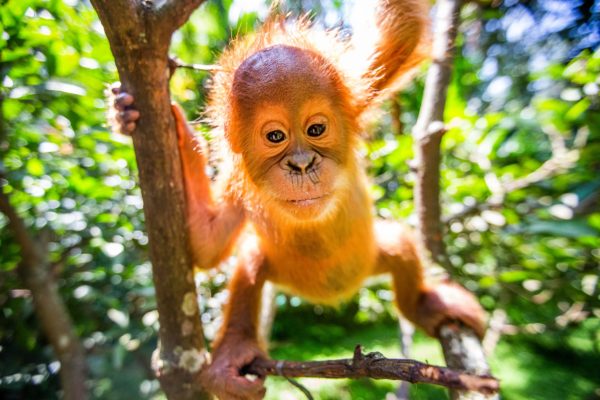Creating solutions
Make-or-break time for conservation action
The Leuser Ecosystem has many friends. Some have been defending the forests for decades, others more recently as forest protection has been recognised as a key climate strategy, and the scale of destruction associated with commodities like palm oil has been laid bare.
In Aceh and the neighbouring province of North Sumatra, a grass-roots conservation movement has grown since the 1990s, when a sharp increase in logging rates preceded a palm oil boom. Although a substantial area of the Leuser landscape has now been destroyed – including 150 square miles of forest within that part of the Leuser designated as a national park – the damage would be worse were it not for the intervention of local people, who have organised ranger teams and used the full extent of the law to stop forest and wildlife crime. Over the last few years, civil society groups have helped to achieve:
- A 40% decrease in the annual rate of forest destruction between 2016 and 2019
- Deployment of over 40 elite ranger teams, whose patrols have removed over 3,000 snare traps and led poaching to decline up to 90% in some areas
- Relatively stable populations of tiger, orangutan and rhino in core areas
- Restoration of over 12,000 hectares of forest, much of it on land reclaimed from illegal palm oil plantations
- Forest-friendly livelihood options for local communities, including work in the burgeoning forest restoration sector, eco-tourism and agroforestry
- Robust data-led monitoring systems, including ‘rapid response’ alerts to new areas of deforestation
- Lawsuits leading to multi-million dollar fines for rogue palm oil companies, plus the cancellation or postponement of multiple inappropriate infrastructure projects including new dams, roads and mines
- New commitments from multinational companies who source commodities from the Leuser Ecosystem
These successes are the result of many years’ hard work and support from donors around the world. However, the Leuser Ecosystem still has a relatively low profile among the international donor community. The security of stable, long-term funding is hard to come by, and civil society leaders spend time chasing grant income when they could be out there doing what they do best – taking action to protect forests.

LEAF sets out to change this dynamic. As a trusted intermediary between Leuser-focused groups and donors based in Europe, North America and Asia, we bring these worlds together and lower the barriers that commonly stop donors investing in new landscapes – including lack of time, knowledge or confidence about the work’s true impact.
Now is a good time to make these connections. The Leuser is gaining prominence as a globally important carbon and biodiversity resource, at the same time that the fate of Sumatran and many other Asian forests hangs on a knife-edge.
With the support of LEAF and other grantmakers, civil society groups have developed collaborative strategies to consolidate achievements to date and accelerate work along long-term strategic tracks, including the development of a conservation-based economy in Aceh.
By driving investment to this framework – which faces a shortfall of roughly $5 million per year – LEAF plays its part in creating the solutions the Leuser Ecosystem so urgently needs.